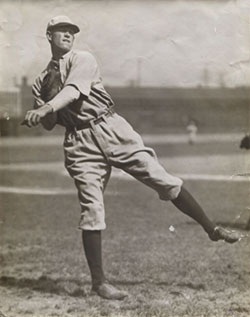Many people in 1900 were drawn to the most popular sports in America – baseball, boxing, and horse racing – because of gambling. Perhaps as influential as newspapers, and later radio, America’s penchant for gambling propelled sports in America to new heights.
Gambling’s influence and appeal hasn’t changed a century later. Even today, in the sports pages that little boys and girls read every day to follow their favorite teams and players, they are presented with the gambling line – horse race handicaps and the favorites and odds in each basketball, baseball, football, and hockey game in the country. Gambling is ubiquitous in sport; we often don’t notice it, even when it prominently stares back at us each morning from the sports page.
And post 1900, gambling permeated Baseball. Examples include:
- Alleged attempted fix of the 1903 World Series
- In 1904, an owner of one of the World Series participant teams bet heavily on his team (not illegal at the time).
- In 1905, Rube Waddell sat out the World Series with a “sore shoulder” that some say earned him $17,000 from gamblers.
- That same year, Manager John McGraw bet $400 on his Giants to defeat the Athletics.
- In 1908, the Boston Nationals didn’t have its license renewed by the city because of too much gambling at its park.
- The same year, McGraw’s Giants attempted to bribe umpire Bill Klem in the one-game playoff with the Cubs to see who would win the pennant.
- In 1911, Garry Herrmann, owner of the Cincinnati Reds, stated that he would no longer deliver telegrams to facilitate gambling.
- In 1912, the Philadelphia Athletics had twenty-five men arrested because of gambling at its ballpark.
- The same year, the Philadelphia Phillies President wrote articles for the Chicago Post accusing the Cardinals’ manager Roger Bresnahan of having thrown key games to the Giants to help them beat Philly for the National League pennant. He also claimed that the umpires were “controlled” by McGraw. The owner was banished from the league for making his claims public, but Bresnahan was also soon released.
- In 1917, future hall of famers Ty Cobb and Tris Speaker would allegedly fix games, incidences that wouldn’t come to light until 1927.
- In 1917, perhaps because of the war, baseball’s gambling problems reached new heights. On June 16 in a game between the Chisox and the Bosox, the outcome of a game was changed because of gamblers. Before the third out in the fifth inning at a game in Fenway Park, gamblers instigated hundreds of fans to run onto the field before the game could become “official” and cause steep losses. When the crowd descended upon the field, the umpires were forced to suspend the game and replay it another day.
- In early September, as the eventual World Series winner Chicago White Sox were closing in on the pennant, they sent a $1,100 payment to the Detroit Tigers to “lay down” for four games. The money was raised through a collection taken up among all of the Chicago players and sent “as a gift” to Detroit in appreciation for their competitiveness during the season, particularly against the White Sox’ foes. This kind of payment was considered customary. Charles Comiskey did not deny the payment. He merely claimed that sending such presents was an old baseball custom and was not meant to bribe any players. In truth, many bribes occurred at the end of the seasons between teams and players. Some teams bribed other teams to sew up a pennant. And players were given bonuses at year-end if their teams finished second, third, or fourth, so teams bribed other teams to assure their bonus money. Some players who wanted to improve their batting average or extra-base hit totals prior to contract negotiations bribed pitchers to throw them easy pitches to hit. There was hardly a player, owner, or manager who didn’t know about some payment for services rendered.
- In 1918, the World Series was allegedly fixed so that players could make up for reduced compensation caused by smaller gates during World War I.
- In 1919, American League Ban Johnson stated that he would no longer tolerate the gambling in Baseball.
- Gambling by players was customary until outlawed at the beginning of 1919.

RELATED LINKS:
BOOKS:
How to Play First Base
by Hal Chase
The Last Stand of Outlaw Baseball
by John William Smirch
PODCAST:
Mining Diamonds Along the Border
by Mary Darling
